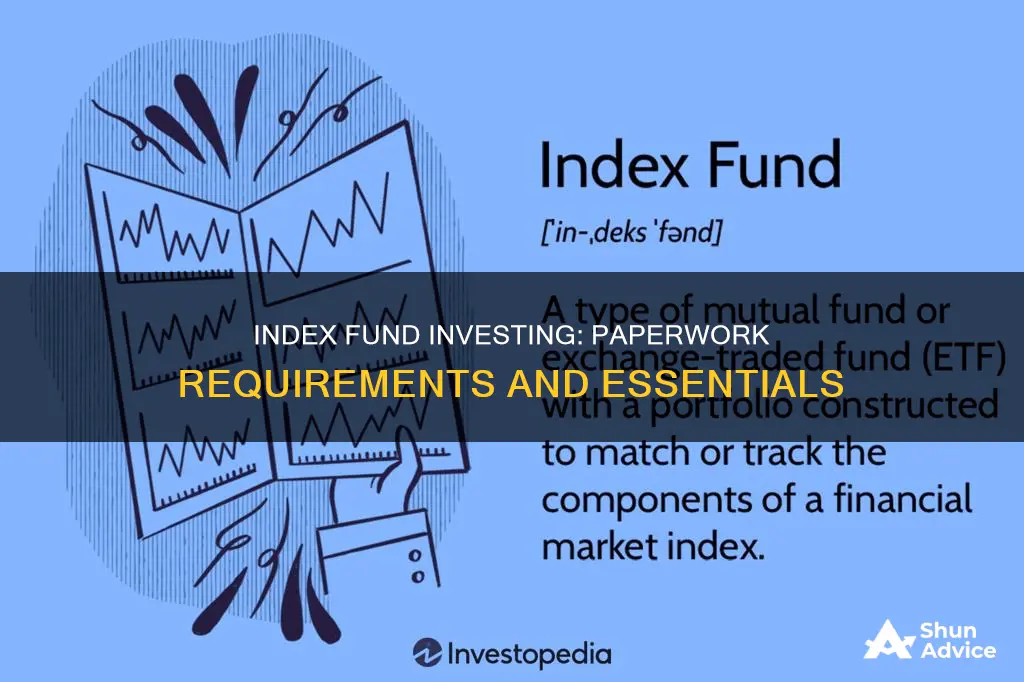
Index funds are a type of investment vehicle that aims to match the returns of a specific market index, such as the S&P 500. They are passively managed, meaning they are designed to mirror the performance of a particular index without any hands-on management. This makes them a low-cost, easy way to build wealth, especially for beginners.
To invest in index funds, you will need to open an investment account such as a brokerage account, individual retirement account (IRA), or Roth IRA. You can then purchase shares of the desired index fund through a mutual fund company, a brokerage, or directly from an index fund provider. When choosing an index fund, it is important to consider factors such as company size and capitalization, geography, business sector or industry, asset type, and market opportunities. It is also crucial to compare fees and performance before investing.
What You'll Learn

What is an index fund?
An index fund is a type of mutual fund or exchange-traded fund (ETF) that tracks the performance of a market index, such as the S&P 500, by holding the same stocks or bonds or a representative sample of them. Index funds are defined as passive investments that mirror the performance of benchmarks like the S&P 500 by mimicking their makeup.
Index funds are created by fund managers who aim to replicate the performance of an underlying index without active management. This means they don't hand-select which stocks or bonds the fund will hold. Instead, the fund manager buys all or a representative sample of the stocks or bonds in the index it tracks. This passive investment strategy means that index funds have lower expenses and fees than actively managed funds.
Index funds are popular with investors because they offer a simple, low-cost, and diversified way to gain exposure to a broad range of stocks or bonds. They are also considered safer than individual stocks due to their inherent diversification.
There are different types of index funds, including broad market, sector, domestic, international, bond, dividend, and socially responsible funds. When deciding which index fund to invest in, it's important to consider factors such as the fund's expenses, taxes, investment minimums, and tracking errors.
Property Fund Investment: What, Why, and How?
You may want to see also

How do they work?
Index funds are a type of investment vehicle that pools money from investors and invests it in securities, such as stocks or bonds. They are designed to track the performance of a designated stock market index, such as the S&P 500, Dow Jones Industrial Average, or Nasdaq Composite. This means that an index fund will hold the same investments as the index it tracks, aiming to mirror its performance closely. For example, an S&P 500 index fund will typically hold the same 500 companies that the S&P 500 index represents.
Index funds are passively managed, meaning that investing decisions are based solely on trying to match the index. They are considered a low-cost investment option, as they require less work than actively managed accounts. Instead of having a manager actively trading, index funds are automated to follow the shifts in value in an index, which keeps costs low.
There are two main types of index funds: mutual funds and exchange-traded funds (ETFs). Mutual funds pool money from investors to buy a portfolio of stocks or bonds, and investors buy shares directly from the mutual fund company. ETFs, on the other hand, are traded on exchanges like individual stocks, offering more trading strategies such as timing share trades and short selling.
When choosing an index fund, it is important to consider factors such as company size and capitalization, geography, business sector or industry, asset type, and market opportunities. It is also crucial to compare fees and performance before investing, as some index funds have lower costs and better returns than others.
Overall, index funds offer investors a simple, low-cost way to diversify their portfolio and build wealth over the long term.
Hedge Fund Tax Havens: Investing Secrets for the Rich
You may want to see also

What are the benefits?
Index funds are a great way to build wealth over time, and they are popular with retirement investors. They are a group of stocks that mirror the performance of an existing stock market index, such as the Standard & Poor's 500 index. Here are some benefits of investing in index funds:
Low Costs and Fees
Index funds are passively managed, meaning they don't require a manager to actively decide which investments to buy or sell. As a result, they have much lower management fees than other funds. They also have lower transaction costs because they trade less frequently. These lower costs can make a significant difference in your investment returns over time.
Tax Advantages
Index funds generate less taxable income than other types of investments because they trade less frequently. Additionally, they can choose which lots to sell when selling a particular security, allowing them to sell the ones with the lowest capital gains and lower tax burden.
Diversification
Index funds provide immediate diversification, as they allow you to own a wide variety of stocks across different sectors and industries with a single purchase. This diversification helps to reduce risk and volatility in your investment portfolio.
Strong Historical Performance
Index funds have consistently outperformed other types of funds in terms of total return over the long term. This is due to their low costs and passive management strategy.
Simplicity and Ease of Use
Index funds are straightforward and easy to invest in, even for beginners. They don't require extensive research or knowledge of financial markets to make smart investment decisions.
Investment vs Mutual Funds: What's the Difference?
You may want to see also

What are the drawbacks?
Index funds are a popular investment choice due to their low fees, broad diversification, and passive management strategy. However, they also come with certain drawbacks that investors should be aware of before deciding whether to include them in their portfolio. Here are some key disadvantages of investing in index funds:
- Lack of Flexibility: Index funds are designed to mirror a specific market index, which means they lack the flexibility to pivot away when the market shifts. They rise and fall with the market, and their value declines when the market does. This inherent lack of flexibility can be a concern during prolonged market downturns, as these funds can perform poorly in line with the broader market.
- Inclusion of All Securities: Index funds automatically include all the securities in an index, which may lead to investing in overvalued or fundamentally weak companies. This strategy might result in missing out on better returns from other investments.
- Market-Cap Weighting: Many index funds use market-cap weighting, where companies with higher market capitalizations have a more significant influence on the fund's performance. This concentration can increase the risk of being too dependent on the fate of a few large companies, and your returns could be negatively impacted if these companies underperform.
- No Chance to Beat the Benchmark: Index funds are designed to match the performance of a market index or benchmark. If you're an investor who aims to outperform the market and prove your mettle as a superior investor, index funds may not provide you with that opportunity.
- Short-Term Downside Risk: Index funds track their respective markets during both good and bad times. They can be volatile investments, especially during periods of economic downturn or poor stock market performance. When the index an index fund is tracking plunges, the fund will also plunge, exposing investors to potential losses.
- Diversification Trade-offs: While diversification is a benefit of index funds, it also has its trade-offs. Depending on the chosen index, investors might end up owning stocks they would rather avoid while missing out on other desirable investments.
Finding Mutual Fund Investment Details: A Comprehensive Guide
You may want to see also

How to invest in them?
Index funds are a great investment for building wealth over the long term. Here is a step-by-step guide on how to invest in them:
- Have a goal for your index funds: Before investing in index funds, it is important to know what you want to achieve with your money. Index funds are ideal if you are looking to grow your money slowly over time, especially if you are saving for retirement.
- Research index funds: Once you know which index you want to track, look at the actual index funds you will be investing in. Consider factors such as company size and capitalization, geography, business sector or industry, asset type, and market opportunities.
- Pick your index funds: When choosing an index fund, cost is an important factor. Index funds are cheap to run because they are automated to follow shifts in value in an index, so look for funds with low management costs.
- Decide where to buy your index funds: You can purchase an index fund directly from a mutual fund company or a brokerage, or through a brokerage account, individual retirement account (IRA), or Roth IRA. When choosing where to buy, consider fund selection, convenience, trading costs, impact investing, and commission-free options.
- Purchase your index fund: To purchase shares of an index fund, you will need to open an investment account. You can then buy the fund through your chosen platform or app. You may be able to select a fixed dollar amount to spend or choose a number of shares.
- Keep an eye on your index funds: Index funds are passive investments, so you don't need to monitor them as closely as other investments. However, it is important to check in from time to time to ensure that your fund is mirroring the performance of the underlying index and that fees are not stacking up.
Invest in Mutual Funds: Bank as a Gateway
You may want to see also
Frequently asked questions
To invest in index funds, you will need to open an investment account. This can be a brokerage account, an individual retirement account (IRA), or a Roth IRA. You can then use this account to purchase shares of your chosen index fund.
Index funds offer a simple, low-cost way to invest in a diversified range of stocks or bonds. They are passively managed, which means they aim to mirror the performance of a specific market index, such as the S&P 500. This means you don't need to actively pick and choose investments. Index funds also tend to have lower fees than actively managed funds.
While index funds offer diversification and lower risk compared to investing in individual stocks, they are still subject to market volatility. If the market declines, your index fund investments will also lose value. Additionally, index funds may include investments in underperforming companies, which can drag down the overall performance.
When choosing an index fund, it's important to consider factors such as the fund's investment objective, fees, performance, and the index it tracks. Compare the expense ratios of different funds to find the most cost-effective option. Research the fund's historical performance, but keep in mind that past returns do not guarantee future results.
You can purchase shares of an index fund directly from a mutual fund company or through a brokerage. If you don't already have a brokerage account, you will need to open one before making your purchase. Some brokers may offer commission-free trading options or discounts on certain index funds.
While index funds are typically long-term investments, it's a good idea to periodically review your portfolio to ensure it aligns with your financial goals and risk tolerance. Check that your index fund is performing as expected and that the fees are not excessive.







